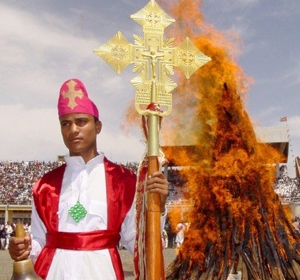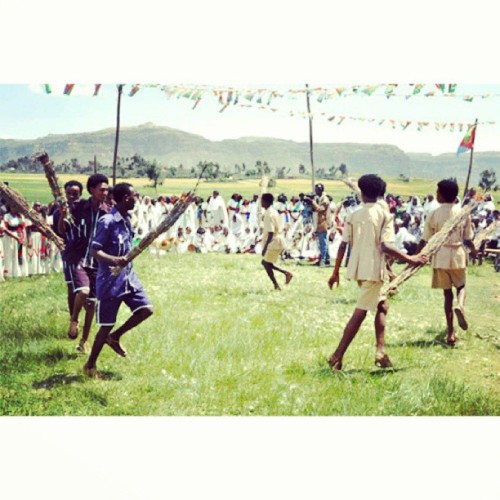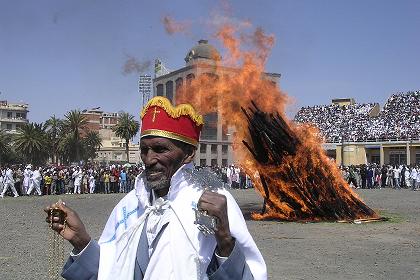New Year’s
Day. January 1. Eritrea celebrates
the New Year like other countries with festivities, food, and drink. Many Eritreans also slaughter a goat or
pig as part of a sacrifice to God.
People stay up late to ring in the New Year, and many people in the
larger cities watch the fireworks displays that are put on for the people.
Orthodox
Christmas. January 7. There’s a celebratory aura in the air
during the week between New Year’s and Orthodox Christmas. Restaurants will
sometimes have special menus and serve their specialties during this time. Cities decorate for the occasion, and
it’s a busy time for people to buy food, sweets, new clothes, and gifts. The day before Christmas is the traditional
time to slaughter an animal for the holiday, and Christians will also celebrate
the holiday by attending a special Christmas mass.
Epiphany. January 19. Epiphany is celebrated for the acknowledgement of Jesus
Christ as the human form of God the Son. This Timket religious holiday is
celebrated with fervor across the country. In the capital of Asmara, churches hold a nightlong prayer
vigil attended by religious officials and ranking members of the
government. Water is sprinkled on
the faithful who attend these special prayer services. During these events, priests also sing
hymns and holy dances are performed.
Birth of
the Prophet. February 5. Also known as Mawlid al-Nebiy or Mawlid
al-Nabi, many schools and businesses close to allow Muslim families celebrate
the birth of the Prophet Muhammad.
It’s a jovial celebration, complete with street festivals and good food
and drink. The singing of hymns is
a tradition that occurs every year with Mawlid.
Fenkil
Day. February 10. This holiday is in commemoration of Operation
Fenkil (1990). It primarily took
place in the coastal city of Massawa, where the Eritreans launched a surprise attack
against the Ethiopians and took over the city. Even after the Eritreans took control of Massawa, the
Ethiopians continued to aerial bomb the civilian sections of the city with
napalm and cluster bombs. The
largest celebrations indubitably are celebrated in Massawa and include music,
dance, street festivals, comedy skits, fashion shows, and a lot of good food
and drink.
Women’s
Day. March 8. Also known as International Women’s
Day, this holiday is celebrated all over the world on this day. Eritrean women are forced into
conscription (forced to participate in active duty military service) where they
are discriminated against and often the subject of sexual abuse and harassment. War and armed conflict have displaced
families, leaving many women as the sole breadwinner and caretaker for their
children and aging parents.
Good
Friday/Easter. Varies. Many people fast during the 56-day
Lenten period (it’s a vegan fast: no animal products of any kind including
meat, milk, butter, etc.) and will start their Good Friday off by going to
church. The afternoon is spent
preparing for the end of their fast.
The main service starts on Saturday night with singing and some dancing.
At midnight, a chicken is slaughtered for the occasion, and at 3 a.m., people
will return home to eat and break their fast. Easter, also called Fasika, is a day of celebration, filled
with a lot of savory foods and often with a special brew from honey made
locally.
May
Day. May 1. Also known as International Worker’s
Day. It’s a day to celebrate the
worker and discuss labor issues.
Creating jobs and strengthening the economy is always on the forefront
of Eritrean economic advisors’ and people’s agendas alike. Work conditions, such as safety issues
and workplaces discrimination, are also topics in roundtable discussions. Activities vary across the country, but
some organizations take part in reforestation events.
Independence
Day. May 24. One of the most important holidays of
the year, this day celebrates Eritrea’s independence from Ethiopia in
1991. A 30-year war ensued between
the two countries following Eritrea’s independence. The day is filled with celebrations in the streets as well
as formal celebrations in stadiums where various performances are held. Celebrations are held throughout the diaspora:
Germany, England, Sweden, the US, and others. (I found out there’s an Eritrean Independence Day
celebration in Indianapolis the evening before, but it’s $25/adult. Probably
not gonna make it since it’s looking like a no-kid event.)
Martyr’s
Day. June 20. This holiday was enacted to commemorate
those who have died in the three decades of war defending their country. A forest and wildlife preserve was
opened outside of Asmara called the National Martyr’s Park; many visitors come
to this park on this day. It’s
also a time to visit the gravesites of loved ones who have passed away during
the fight for independence.
Eid
al-Fitr. Varies. This holiday celebrated by Eritrea’s
Muslims celebrates the end of Ramadan, the month-long fast. To break the fast, families prepare a
great feast to celebrate together after special prayer services are held at the
local mosque.
Start of
the Armed Struggles. September 1. Start of the Armed Struggle goes back
to the first shots fired in 1961, beginning the war to break away from
Ethiopia. Led by Idris Hamid
Awate, those historical shots fired took place in the western region of the
country at Mount Adal. Government
officials will often make speeches and a playing of the national anthem follows
a moment of silence.
Geez New
Year. September 11. It does seem
odd to have a New Year’s celebration in September, but it’s because of a
difference in calendars and a “leap month” of sorts that falls at this
time. One of the key traditions at
this time is to take a bath. (My
kids are already not impressed.) But in Eritrean tradition and culture, taking
a bath on this day washes the body of any bad vibes and ensured a healthy body
for the year to come. The girls
will often play drums and sing songs for coins that they can use to buy jewelry
and accessories to decorate themselves for the New Year celebrations. Special New Year prayers are said and
the evening ends with a bon fire.
Finding of
the True Cross. September 27. Also
called Meskel Holiday. Tradition
holds that Queen Helena (or Saint Helena) was the one who found the actual
cross used in the crucifixion after having a dream that told her to make a
bonfire and its smoke would guide her to it. So, naturally bonfires are common practice on this day based
on the story. People also try to
interpret their own symbols in the smoke and make predictions based on the
direction the smoke is blowing.
Eid
ul-Adha. Varies. Also called Feast of the Sacrifice,
this Muslim holiday is centered around the story of Abraham as he was preparing
to sacrifice his only son to God but was stopped at the last minute. It’s common for an animal to be
slaughtered around this time, keeping part of the meat, giving part of the meat
to family, and giving part to charity.
Christmas
Day. December 25. While the Orthodox Church celebrates
Christmas on January 7, other denominations celebrate Christmas on this
day. Eritreans start their
shopping a few weeks before Christmas and decorate their homes and businesses. Some families slaughter a goat or a sheep
during the holiday season. One of
the largest traditions is that families get together and share meals together,
complete with coffee (I’m certainly ok with that) and popcorn and panettone (an
Italian sweet bread often served at Christmas; I think it’s good). Christmas morning
is when everyone exchanges gifts and visits family.
Up next:
art and literature







enjoyed the read and learning more about my friend's culture
ReplyDelete